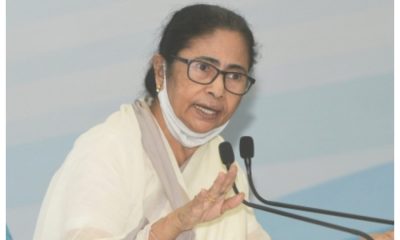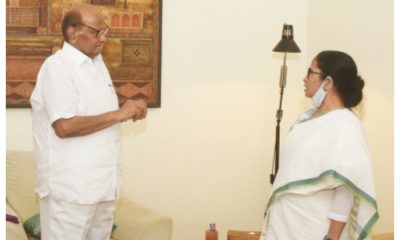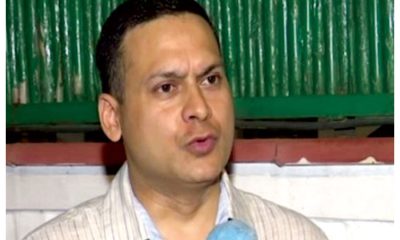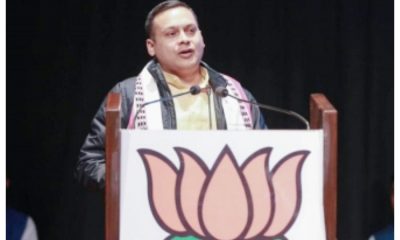National News
Mamata likely to meet Modi next week
If everything goes according to the schedule then Chief Minister Mamata Banerjee is likely to meet Prime Minister Narendra Modi by the middle of next week.
According to official sources Banerjee might go to Delhi on November 22 and is likely to return on November 25. During her two-day stay in the national capital, she is likely to meet the Prime Minister and discuss pending issues.
Sources in the CMO (Chief Minister’s Office) indicated that the discussion of the Chief Minister with the Prime Minister might revolve around the pending financial dues of the state and the recent extension of the operation area of BSF from 15 kilometres to 50 kilometres. The chief minister is also likely to meet the leaders of the opposition parties, including Congress chief Sonia Gandhi.
The extension of the area of operation of the BSF has triggered political controversy and several Trinamool Congress leaders have raised their voices against the Centre’s decision alleging that this is an intrusion in the federal structure of the country.
Chief minister Mamata Banerjee has written to the Prime Minister protesting against the Centre’s decision. Trinamool Congress have even decided to bring a resolution against this in the Assembly on Tuesday. Senior Trinamool leader Sougata Roy said that the party will raise their voice in the winter session of Parliament. So, it is expected that Banerjee will have a discussion with the Prime Minister on this issue, sources said.
Chief Minister Mamata Banerjee has also been vocal regarding the pending financial dues of the state. It is expected that she will also apprise the Prime Minister about the financial dues of the state. Recently the Minister of State for finance Chandrima Bhattacharya raised the issue during a meeting with Union Finance Minister Nirmala Sitharaman on Monday.
According to the state, the Centre is increasing its income by imposing cess, but the states are not getting their share. The state’s demand was that the the authority to take a loan of 5 per cent of the GDP by the Centre was accepted at only 3.5 per cent. Not only that, the state has been alleging that they are not getting the portion of the central funds for the centre-state run projects. The Centre is also not releasing funds for the disaster affected people. These issues are likely to take the centre stage of the discussion.
In July after coming to power for the third time Banerjee went to Delhi and met several leaders, including Sonia Gandhi but things have changed in these few months. Mamata Banerjee and Abhishek Banerjee have repeatedly attacked the Congress for their inability to lead the opposition against BJP.
With the Trinamool trying to spread its organisation to smaller states like Goa and Tripura, the perspective of Trinamool Congress and Mamata Banerjee have changed in the last five months. The party that was once considered to be a regional outfit is trying to emerge as an alternative to the Congress nationally. So Mamata Banerjee’s meeting with the opposition leaders will definitely have a significance.
National News
Mahaparinirvan Diwas 2025: Dr Ambedkar’s Mumbai Memorial To Near Completion By Dec 2026 | All You Need To Know
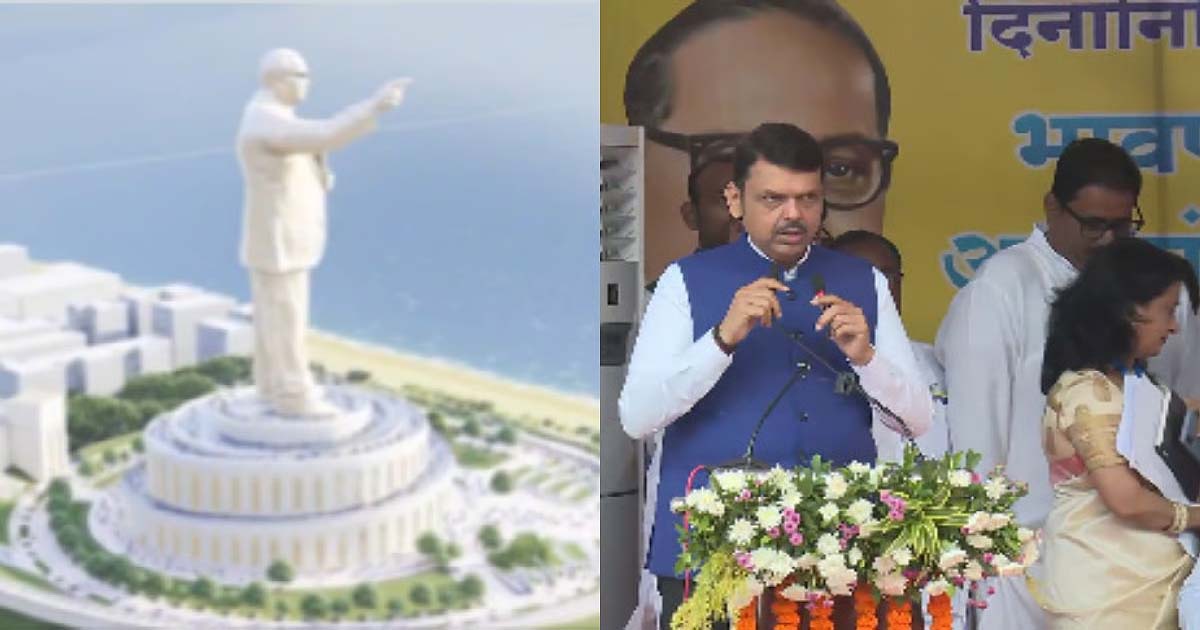
Mumbai: Maharashtra Chief Minister Devendra Fadnavis on Saturday, December 6, said all efforts will be taken to ensure completion of the grand memorial of Babasaheb Ambedkar at Indu Mill in Mumbai’s Dadar area by next year. While speaking at a function at Dadar’s ‘Chaityabhoomi’ to mark the 69th Mahaparinirvan Day (death anniversary), the CM said, “Construction work is on, and all efforts will be taken to complete it by December 6 next year.”
– The under-construction 450-foot memorial of Bharat Ratna Dr Babasaheb Ambedkar, taking shape very close to the sacred ground of Chaityabhoomi, features a 350-foot-tall statue and a 100-foot-high pedestal.
– A steel and bronze statue, standing 350 feet tall, is being prepared in Ghaziabad by the firm of renowned sculptor Ram Sutar, a Maharashtra Bhushan and Padma Bhushan awardee.
– More than 1,478 tonnes of steel and 107 tonnes of bronze have already been procured; intricate bronze panels covering 661 square metres are complete.
– The 4-hectare memorial also features a 1,000-seater auditorium, a research centre with seminar halls, a library, a meditation area, a promenade, a Parikrama Path, two-story parking area.
– In an update by MMRDA, it stated that over 54 per cent of the work on the monument is complete.
– The Maharashtra govt had in 2013 appointed the Mumbai Metropolitan Region Development Authority as the Special Planning Authority (SPA) for the development of the memorial on a 4.84-hectare plot. Its ‘bhoomi pujan’ was held on October 11, 2015, at the hands of Prime Minister Narendra Modi.
– The site is close to ‘Chaityabhoomi’, where lakhs of followers converge every year on December 6 to mark the death anniversary of Ambedkar. He died on this day in 1956.
NCP (SP) working president Supriya Sule has questioned the delay in the construction of the memorial complex. While speaking to reporters
Speaking to reporters after paying tribute at ‘Chaityabhoomi’ on the 69th Mahaparinirvan Diwas of Babasaheb Ambedkar, she said, “Even after land was given for the grand memorial, why is it taking so long to complete it? Big road and infrastructure projects of the state are being completed, but this memorial is a place of faith for all of us. Why is it still not complete? The state government must answer.”
Crime
Thane NDPS Wing Busts Drug Racket; Over 2.2 Kg Hashish Worth ₹1.10 Crore Seized In Mumbra, 1 Accused Arrested
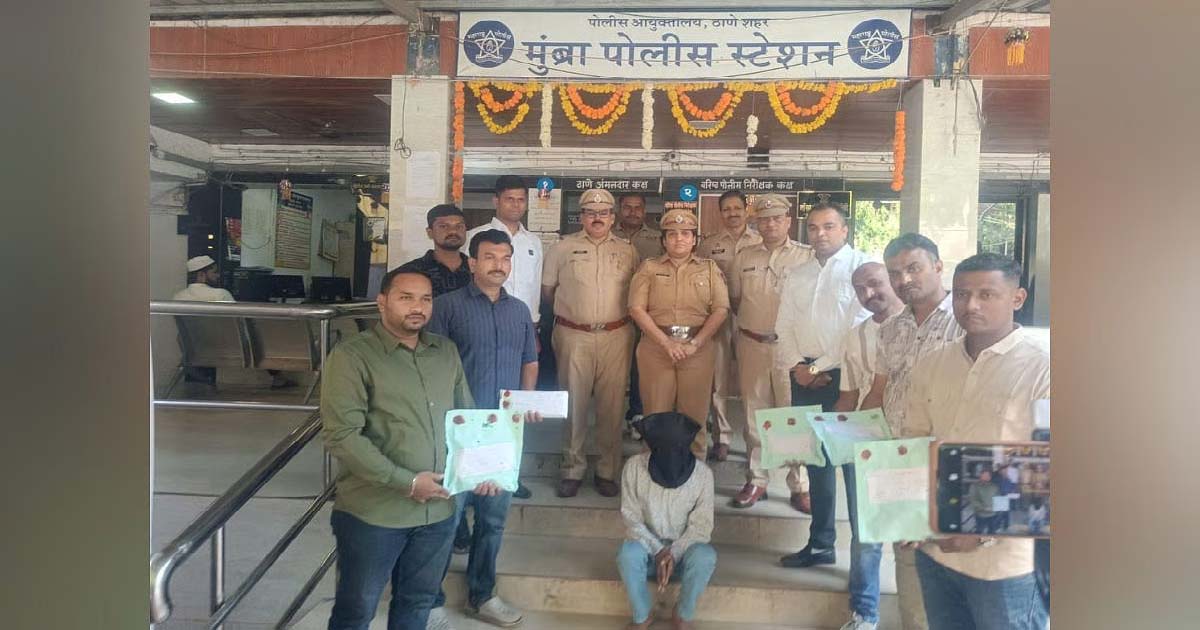
Thane, Dec 06: Thane City’s NDPS branch has achieved a major success. Under an on-ground operation, the police have exposed an active gang selling narcotic substances. In this action, the police have recovered approximately 02 kg 201 grams of hashish (charas), the market value of which is estimated to be one crore ten lakh sixty-five thousand rupees.
This operation was led by Senior Police Inspector Nitin Shinde. His team included officers and personnel from the crime branch, who carried out this action based on secret information.
Police had received information that some individuals were selling hashish and other intoxicating substances in the Mumbra area. Following this, the team laid a trap, cordoned off, and caught the suspect in the Bandewadi area. A large quantity of hashish was recovered from his possession upon search.
The suspected accused has been identified as Moin Khan, alias Hasrat Ali Siddiqui. Preliminary interrogation revealed that he used to illegally procure hashish from Jammu and Kashmir and sell it in Thane, Mumbai, and surrounding areas. The accused already has several serious crimes registered against him.
In this regard, Mumbra Police has registered a case under NDPS Act 20(a)(i)(b), 29, and further investigation is underway. The police are also trying to find out who else is involved in this network and how far this hashish supply chain extends.
Mumbai Press Exclusive News
On the 33rd anniversary of the Babri Masjid demolition, Mumbai’s streets reverberated with chants of “Allahu Akbar.”Peaceful protests and prayers for recovery were offered, with police on alert.
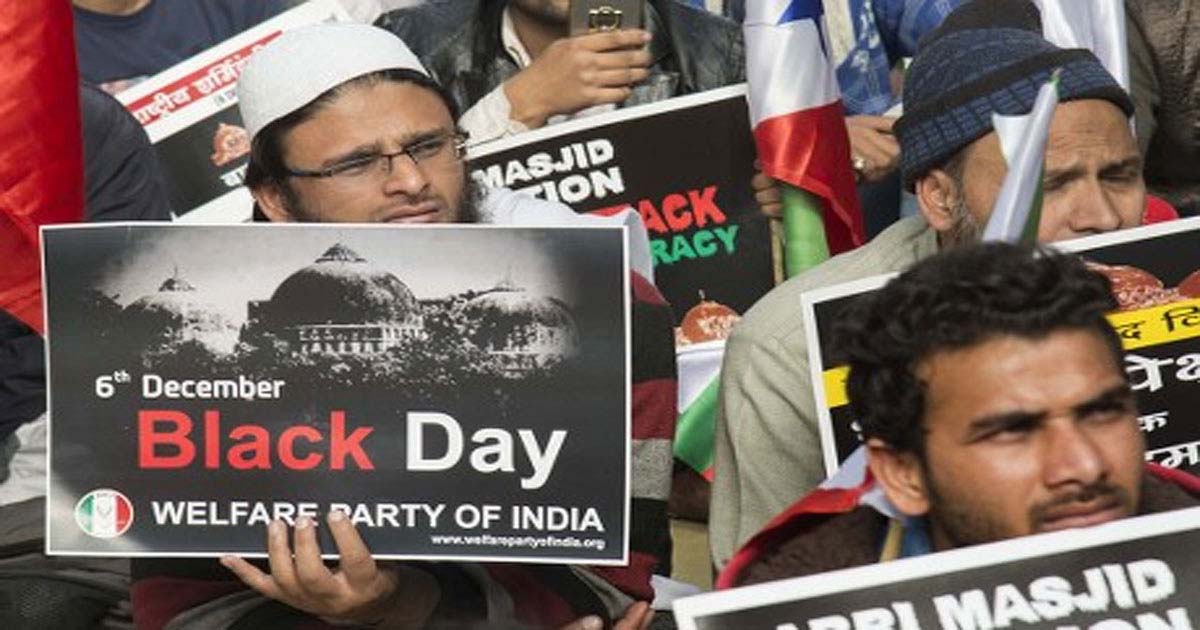
On the 33rd anniversary of the Babri Masjid demolition in Mumbai, mosques, streets, and intersections in the city and suburbs echoed with the call to prayer of Allahu Akbar, Allahu Akbar, when the miscreants had demolished the Babri Masjid at 3:45 pm. Muslims believe that the Babri Masjid is a mosque from the throne to the floor and will remain a mosque until the Day of Judgment. Therefore, Muslims observed a black day of protest on December 6. Prayers were also offered for the recovery of the Babri Masjid on this occasion. Raza Academy had announced to observe a black day on the martyrdom of the Babri Masjid and to give collective azans in mosques. On this occasion, Raza Academy organized azan at the intersections of Muslim-majority areas, especially Minaret Masjid and other mosques. On this occasion, the police had made strict security arrangements. Muslim organizations also observed a black day by giving azan and protesting on the martyrdom of the Babri Masjid. Muslims also remembered the grief of the martyrdom of the Babri Masjid by posting statuses related to the Babri Masjid on social media and every Muslim looked sad.
33rd anniversary of the Babri Masjid demolition; Azans were given in the city on the appeal of Raza Academy. On the occasion of the 33rd anniversary of the Babri Masjid demolition, Raza Academy gave azan in different areas of the city at 3:45 pm. The aim of this initiative is to keep the memory of this historical event fresh and pay tribute to the martyrs of Babri Masjid. Raza Academy gave azan in particular at Khatri Masjid, Bunyan Road, Minare Masjid, Muhammad Ali Road Corner, Bhandi Bazaar, Neer Mandvi Post Office. On this occasion, scholars prayed for the recovery of Babri Masjid and made it clear that Babri Masjid was taken by fraud. Babri Masjid will remain a mosque until the Day of Judgment. The miscreants have tarnished the constitution of the country by demolishing this mosque, which will always remain a fresh wound like injustice. Raza Academy head Saeed Noori said that Black Day is observed on the martyrdom of Babri Masjid. On this day, Raza Academy organizes Azan and peaceful protests are held against this injustice. He said that miscreants targeted the mosque and martyred it while it was protected, but even today its perpetrators are free. The Supreme Court has also accepted that Babri Masjid was not built by demolishing a temple, while miscreants have put a stigma of oppression and injustice on the chest of the country. Every year on the anniversary of Babri Masjid, Raza Academy refreshes its memory by giving Azan. There is a sorrow that will always remain. Mumbai Police had made strict security arrangements on the anniversary of Babri Masjid and an alert was issued in the city.
-

 Crime3 years ago
Crime3 years agoClass 10 student jumps to death in Jaipur
-

 Maharashtra1 year ago
Maharashtra1 year agoMumbai Local Train Update: Central Railway’s New Timetable Comes Into Effect; Check Full List Of Revised Timings & Stations
-

 Maharashtra1 year ago
Maharashtra1 year agoMumbai To Go Toll-Free Tonight! Maharashtra Govt Announces Complete Toll Waiver For Light Motor Vehicles At All 5 Entry Points Of City
-

 Maharashtra1 year ago
Maharashtra1 year agoFalse photo of Imtiaz Jaleel’s rally, exposing the fooling conspiracy
-

 National News1 year ago
National News1 year agoMinistry of Railways rolls out Special Drive 4.0 with focus on digitisation, cleanliness, inclusiveness and grievance redressal
-

 Maharashtra1 year ago
Maharashtra1 year agoMaharashtra Elections 2024: Mumbai Metro & BEST Services Extended Till Midnight On Voting Day
-

 National News1 year ago
National News1 year agoJ&K: 4 Jawans Killed, 28 Injured After Bus Carrying BSF Personnel For Poll Duty Falls Into Gorge In Budgam; Terrifying Visuals Surface
-

 Crime1 year ago
Crime1 year agoBaba Siddique Murder: Mumbai Police Unable To Get Lawrence Bishnoi Custody Due To Home Ministry Order, Says Report



